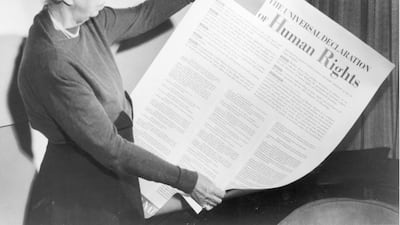"I myself had always believed that women might have a better chance to bring about the understanding necessary to prevent future wars if they could serve in sufficient number in these international bodies."
– Eleanor Roosevelt
As the world marks the 71st birthday of the Universal Declaration on Human Rights, it is worth reflecting on the words of its author and champion, Ms Roosevelt, to celebrate how far women have come on the world stage – and how much work remains to be done to improve their status.
The Emirates Diplomatic Academy Gender and Diplomacy Diplograph, released last year, mapped the percentage of female ambassadors representing the countries of the G20 group of nations. It found that out of the 2,607 ambassadors currently appointed by member-states, only 435 – or 16.7 per cent – are women.
Despite these figures, the past two decades have witnessed a significant increase in women’s participation in diplomatic and political circles. A 2016 study on gender, international status and ambassadorial appointments by researchers at Britain's Oxford University found that women now make up between 25-40 per cent of the ambassadors of a number of states, particularly in Scandinavian countries such as Finland, Norway and Sweden. In the US, the figure is now 30 per cent and in Canada, it is 29 per cent.
In 2019, I am proud to say that the UAE leads measures of female empowerment within our diplomatic service. As of October this year, 49.5 per cent of the employees of the UAE’s Ministry of Foreign Affairs and International Co-operation are women. This includes female ambassadors in major embassies including the UN missions in New York, the Netherlands, Brazil, Finland and Denmark.
Female advancement in diplomacy is an important marker of equality but there is also a strong body of academic research backing Ms Roosevelt’s claim that women have a better chance of preventing future conflict. For example, a 2018 study by Jana Krause of the University of Amsterdam that investigated 82 peace agreements in 42 armed conflicts between 1989 and 2011 found those with women signatories were associated with higher rates of durable peace.
A 2015 Georgetown Institute for Women, Peace and Security study of peace processes found that when civil society groups – including women’s organisations and religious groups – were included, the accords were 64 per cent less likely to fail.
Even more striking, a comprehensive analysis of 156 peace agreements from 1989 to 2011 demonstrated that they have a 35 per cent chance of lasting 15 years or longer when women are included in the process.
We must empower women in senior diplomatic roles on the one hand while also ensuring that our domestic and foreign policies empower women around the world.
In 2015, the UAE established the Gender Balance Council, tasked with increasing the role of women across all positions in government. Now, half of the Federal National Council is comprised of women, along with one-third of the Cabinet.
The UAE is also a major supporter of the UN’s role in promoting women’s empowerment, both regionally and globally. At the UN General Assembly in New York this autumn, the UAE announced a contribution of $15 million over the next three years to support UN Women.
Another example is the launch of the Arab Charter on Women's Rights this year in Abu Dhabi. Enacted by the Arab Parliament, the charter secures the rights of Arab women to equality in political and public life at the national, regional and international levels.
While these achievements are a source of optimism and pride, our country and leadership recognise that we all must continue to work concertedly with regional and international partners to identify gaps and implement effective, long-term strategies to further raise the status of women in pursuit of their full potential.
Hend Al Otaiba is director of strategic communications at the Ministry of Foreign Affairs and International Cooperation


